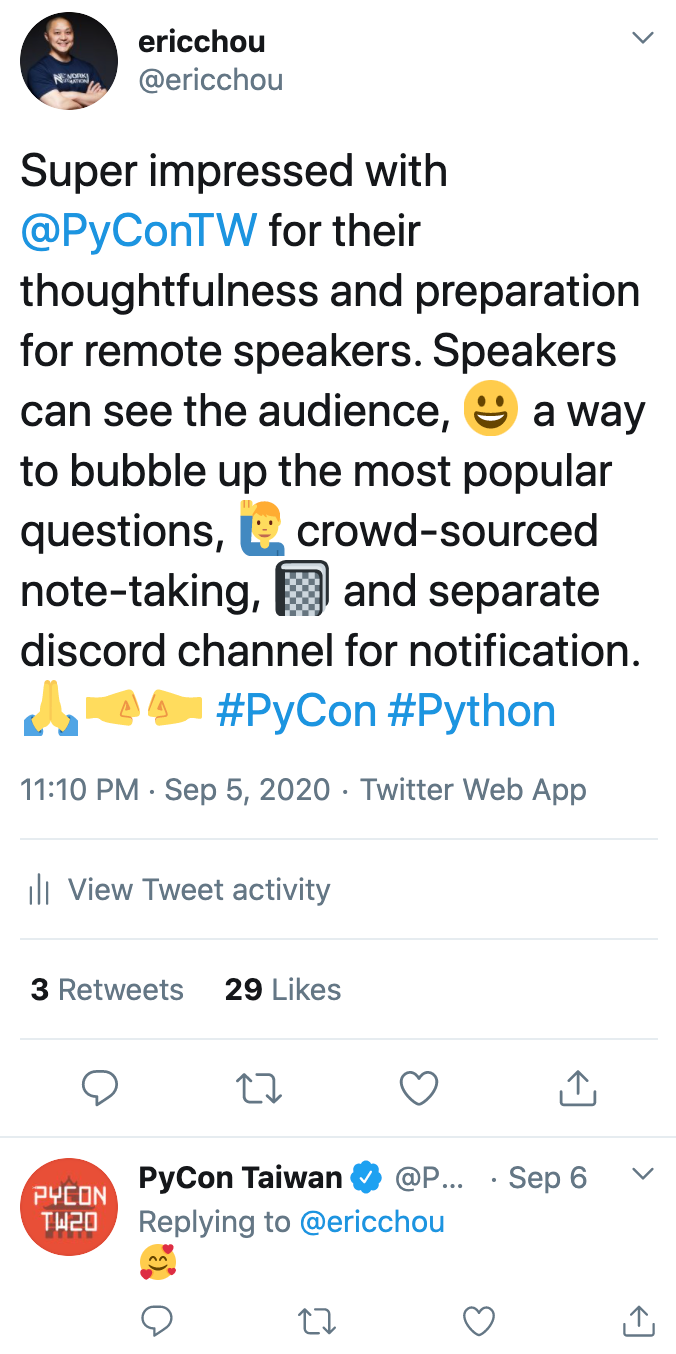PyCon TW 2020 Session Lessons and Thoughts
PyCon TW 2020 took place between September 5th - 6th, 2020 in Taiwan a few weeks ago. I wanted to take a few moments to reflect on this experience, particularly because most of the conferences have gone 100% virtual due to COVID-19 but PyCon TW 2020 was a hybrid between Online and Offline (for Taiwan's successful effort in containing COVID-19, check out this CNN article). As more and more of the conference have gone online in the coming future, maybe these lessons will be helpful for my fellow speakers and aspiring attendees.
This post is mainly about the experience and not the technical details, if you are interested in the technical aspects of the talk, here are the links:
Slides avaialble on SpeakerDeck (English)
Examples available on GitHub (English)
Ok, here we go on the lessons and thoughts about this experience.
PyCon TW 2020 Took the Time to Care for Remote Speakers
I was very impressed with the time and effort the PyCon TW team took to accommodate the remote speakers. It may have helped that 2 out of the 3 Keynote speakers were remote, but it was still something awesome the team pulled off. From the speaker's perspective, if more conferences are doing these, we might be headed for a permanent virtual/offline conference hybrid model for the future. Here are the things the conferences provided for the speakers:
- Two-way camera for the speakers. This might not sound like a big deal but have been able to see the audience made a big difference in calming the nerves and a better communication experience. Many of the remote sessions I have done before allowed the audience to see the speaker but not the other way around.
- Use HackMD for a crowd-sourced note-taking each session. Have you ever had the experience of trying to take notes and listen to the speaker at the same time? Having multiple people taking notes and share might not eliminate the problem completely but it decreases the likely hood of missing important topics. As a speaker, I can also go back to these notes to see if the audience received the important points I was trying to make as well as improve my session for the future.
- The audience gets to vote for the most popular questions using Slido. This is really awesome as it allows me to answer the question most interested in the audience first.
- They use a Discord channel for pre-conference communication as well as out-of-band reminders during the session. Since the sessions are recorded, the out-of-band notice of "one-minute left" will not interfere with the recording.
All in all, it showed how much time and thought the organizers put into organizing the event.

In-Person Conference is Missed
As good as the experience was for the remote speaker, I still missed the in-person conference experience. I think I speak for everybody who have been attending virtual conferences that the two are just not the same. I think we all miss the hallway track and the chance encounters of meeting new people and bounce off new ideas. This is espeically true since this is the first Taiwan PyCon for me, and the Chinese translation of my book was published about a month before the event. I really would have loved to talk to the people about the book, the network automation content, and Python.
When traveling is safe again, I am going to make a real effort in attending one of the PyCon TW events in the future.
Preparation Was Long and Nerve-Racking
Even though the topic of Network Automation is something I have talked about in a number of other talks. The preparation of this talk was still long and nerve-racking. This is probably due to a combination of the fact that the session is conducted remotely in different time zones as well as my first professional presentation in Chinese. After trying and failing to sound naturally during practices, I ended up writing out all the notes in my slides. This took waaaaay longer than I anticipated and I ended up cutting short on the number of practices before the session.
I guess there is always a first time, and good or bad, at least it is done with for now.
Python Community Everywhere is Friendly
One of the reasons many people liked Python, myself included, is the community. The community is always known to be inclusive, friendly, and respectful for all. I remember my insecurities coming from a non-programmer background attending local Python meetups for the first time, and the comfort I felt when I talked to people. PyCon TW is no different. The whole process, from talk selection, pre-conference communication, in-conference experience, to post-conference logistics are all done with great care.
Goal Accomplished
When I initially started my Python journey, two of the goals I set for myself was to publish a book and speak at a Python conference. I accomplished the book publishing goal a few years ago and this PyCon TW talk allowed me to check off the second box. But I think it is important to point out that goals are never a binary thing for me, I enjoy the process of trying to accomplish them but it was never a goal-or-bust mindset. Goals were great at setting a direction but the emphasis is always on the system and process of getting there.
That is it for now for my thoughts and lessons, thank you for reading this far. If you ever wanted to talk at PyCon conferences, I definitely would encourage you to give it a shot.
I hope you and family are staying safe and healthy,
Eric